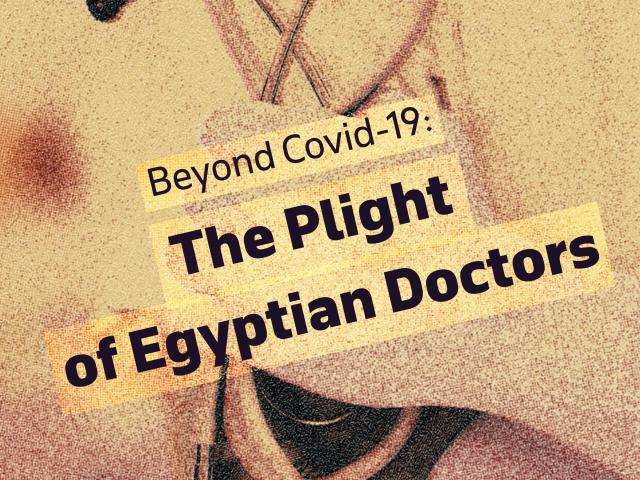
EIPR launches study: “Before and after Covid…The Plight of Egyptian Physicians”
Press Release
The Egyptian Initiative for Personal Rights (EIPR) issued a policy paper entitled “Before and after Covid… the plight of Egyptian doctors”, which reviews the problems faced by physicians in particular and medical teams in general in Egypt, and provides recommendations to improve the conditions of physicians in a way that helps maintain medical service providers inside the country, and increase their numbers, in conditions that guarantee their rights and guarantee Egyptians’ the right to health.
This paper is issued more than a year and a half after the start of the Covid pandemic, which has put physicians and health teams on the front line. Egypt lost during this period nearly 600 of physicians, while performing their duty, at the time in which the number of working physicians in the country has been already declining and not fulfilling the needs of the health sector, as a result of their inappropriate working conditions, as the paper explains.
The paper focuses on physicians, given that data on them, although limited, is more available compared to other members of the medical teams.
The working conditions of Egyptian physicians have long been in need of radical interventions, and a call has been made for a systematic and participatory intervention to introduce much needed developments in the health system. The current crisis revealed the effects of the delay in those discussions and interventions, at a time when Egypt was taking its first steps towards implementing comprehensive health insurance as well as suffering the exposure to a serious global epidemic.
The paper, launched by EIPR, addresses the difficulties facing Egyptian health workers, which make keeping them inside the country a difficult issue. The COVID-19 pandemic represents an opportunity to rethink the Egyptian health system, which requires a clearer picture of the situation of physicians. Why is there a need for more doctors in Egypt, despite the increase in the number of graduates every year? What does this tell us about the environment in which they work? How can this be improved? What does the new health insurance system offer? What are the roles of other stakeholders?
EIPR had held a digital symposium on June 28, entitled "Before and after Covid... the plight of Egyptian physicians ", to discuss the issue, in the presence of Dr. Freddy Al-Bayadi, Member of Parliament, Dr. Osama Abdel Hai, Secretary General of the Medical Syndicate, and Dr. Alaa Ghannam, director of the Right to Health Program at EIPR.
Opinions in the symposium agreed on a number of steps required to improve the conditions of physicians, especially during the stressful conditions the health sector is going through, on top of which is increasing health allocations in the state budget, improving physicians’ wages that currently do not allow them to lead a decent life, protecting physicians and medical teams from violence, providing an accountability system that preserves their rights and the rights of patients, and treating physicians who lost their lives while performing their duty as the nation’s martyrs as is the case with the army and police.
The inability to retain Egyptian physicians within the country is a critical issue, and understanding the roots of this problem requires a comprehensive analysis of the conditions in their working environment, which touch on other basic pillars of the health system, such as: financing, governance, leadership, access to medicines, and service delivery.
The shortcomings of these basic pillars reduce the incentives for physicians to remain in the public sector in particular, and in Egypt in general. Therefore, a critical review of these various aspects, from the physicians’ point of view would reveal the policies needed to keep the "white army" inside the country.
The paper launched by EIPR aims to initiate a dialogue between stakeholders in order to find different paths to improve the conditions of Egyptian physicians, and includes an extensive review of the available literature and focused interviews with important sources of information, as well as with physicians, who are the central topic of the paper.



